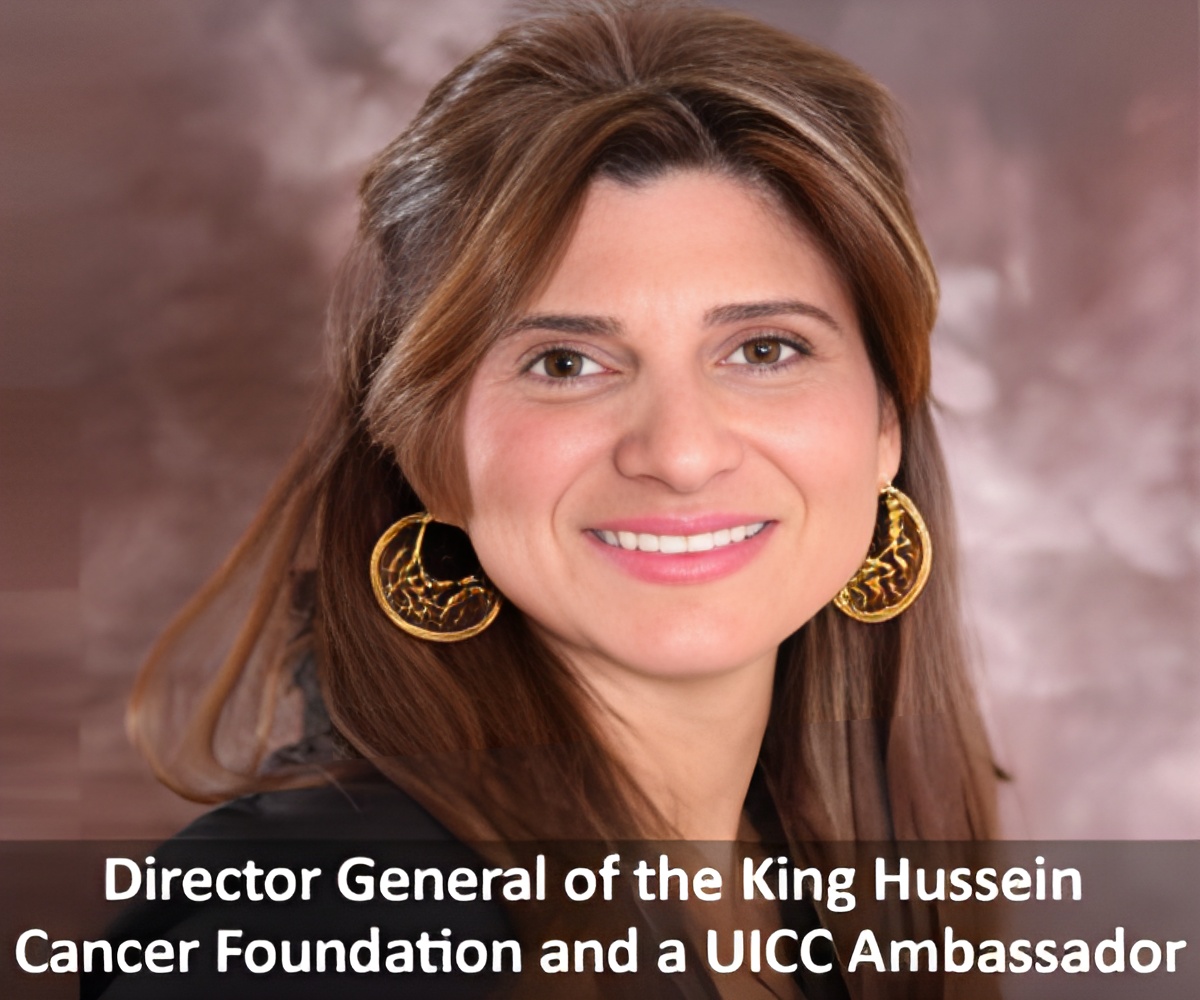HRH Princess Dina Mired, Director General of the KHCF, explains the effective progress of global endeavours towards arresting cancer and her participation at the World Cancer Congress 2012.

A. To be honest, that is not an “either/or” situation. There are members of governments, ministries of health from around the world, and representatives of the World Health Organization who will be actively participating in the World Cancer Congress (WCC).
This Congress actually brings together all the different stakeholders – governments, private sector, civil society, etc. – and provides them with the opportunity to learn about each other and to hear the different views and opinions. I have no doubt that each of these stakeholders will pay attention to what the others are saying and be influenced accordingly. I think that they all ultimately recognize that we have a serious epidemic on our hands, we cannot ignore the fact that 28 million people around the world are suffering from cancer today, and it is only by working together, sharing our ideas and uniting our efforts, that we can put a stop to the needless deaths and suffering.
I urge civil society to take advantage of the opportunity that the WCC provides, especially with policy-makers and decision-makers in attendance, and use this chance to state clearly and strongly what objectives need to be met to ensure that the global targets on the reduction of NCDs (Non-Communicable Diseases)- including cancer - are adopted this fall.
Q. The statistics projected concerning cancer incidence by 2030 is alarming, especially in economically challenged countries. Will this particular issue be addressed?
A. It is true that the numbers are very alarming. In the coming years, the developing world will bear over 70% of the cancer burden and yet receive only 5% of the global funding to fight this disease. This is something that must be remedied immediately. During the WCC there will be several panels that address this topic - I personally will be participating in a session organized by the Global Task Force for Cancer Care and Control which focuses entirely on this issue entitled ‘Closing the Cancer Divide’.
A. There are several great international organizations that work a lot on survivorship and survivors’ needs. These organizations have recognized survivorship as a phase in the cycle of cancer and –especially in the developed world – have been able to delve into the issues facing survivors on a deeper level, addressing the financial, emotional and physical needs.
There is a lot of information out there for all countries to tap into and to learn how to address the issues and support survivors, and there are many global partners who are ready to help, but first each country needs to recognize which stage they are in and recognize their own needs.
Q. What are the challenges in the field of healthcare in the Middle East?
A. While healthcare challenges in our region vary from country to country, in general, the Middle East is facing many of the same challenges that the developing world faces. This is unsurprising since over half the countries in the Middle East are considered low-to middle-income countries. They face a lack of infrastructure for healthcare services, the availability of tertiary care is fluctuating at best, there is an issue with the accessibility of care – especially with regards to NCDs, and they struggle with the high cost of drugs. There is also the challenge of the quality of care when it is provided. In recent years the region has seen an increase in centers of excellence, but there remain many hospitals and centers whose quality of care is an unknown factor. This is due in part to another challenge our region faces which is the lack of skilled workers.
Some countries in our region have taken active steps in prevention efforts, banning public smoking for example, but for many, prevention efforts remain non-existent. Unfortunately, we are also seeing an increase in the risk-factors for NCDs as corporations, such as tobacco and fast food companies, struggling within the increasingly regulated developed world, seek market shares in the less-regulated developing world. Finally, one of the major challenges our region faces is the severe lack of data and surveillance of NCDs and their risk factors. There are very few countries in the region who report cause-specific mortality, and even those that do, rarely have it integrated into the national health information systems which means it is difficult to use for advocacy or effective interventions.
In some countries, the government is the key player and provides all care - including that for NCDs such as cancer. However, in other countries it is left to civil society to fill the gap because government does not have the funds or resources to provide this care. This is our situation in Jordan where our organization, the King Hussein Cancer Foundation and Center, provide the majority of cancer care in the country.
Q. Do you envisage Jordan playing a central role in the Middle East for reasonable, standardized and affordable healthcare?
A. I believe that Jordan is already playing a role in Middle East healthcare, particularly where cancer is concerned. Our success story, the story of the King Hussein Cancer Foundation and Center, is an inspiring story to many countries and organizations, not only in the Middle East but in other parts of the developing world. When they see that we were able to achieve international quality care, that despite the background of a middle-income, resource poor country we are the only cancer center in the developing world to have earned international accreditation from the Joint Commission International as a disease-specific cancer center, they believe that they can do it too. We currently work with many hospitals in our region, for training or fellowship programs, or simply an exchange of ideas. As we move forward with our new plans and developments, I believe that we will continue to be both a role model and a motivation to our region.
Q. How has reaction to cancer changed over the years in Jordan?
A. There definitely remains a stigma with regards to cancer in Jordan and the region. However, it is very much improved from where we were even ten years ago. At that time, patients suffering from cancer were a hidden statistic in our part of the world, an uncomfortable truth and a taboo subject. Cancer patients had to deal not only with their disease, but they also suffered silently, alone in a world of secrecy, fear and shame. This was compounded by the fact that with the lack of quality treatment at the time, and therefore people not surviving cancer, so people quite rightly saw cancer as a death sentence. Now that they have seen people 'can' survive cancer, they are much more willing to talk about it, to seek treatment early on, and even get screened for early detection.
His Majesty the late King Hussein of Jordan was one of the very first to fight the stigma of cancer in our region. As you may recall, he fought a very public battle with cancer with the utmost of grace and dignity. The King Hussein Cancer Foundation and Center work every day through awareness programs and community involvement to reduce the existing stigma and to uphold His Majesty’s vision of comprehensive cancer care available locally to Jordanians. Thankfully, with our accredited Center, patients can now face their disease head on with the knowledge that they are in one of the best comprehensive cancer centers in the world.
Q. When it comes to awareness, resources and medical treatment what are the challenges hindering the progressive measures taken?
A. In recent years there has been amazing progress and many measures that have been adopted globally. However, on the ground in the developing world, we still face an overwhelming number of challenges.
The developing world is still struggling with a lack of resources, the high cost of drugs, a deficiency of skilled labor and expertise, and in many cases the lack of infrastructure for even basic healthcare. Prevention and awareness efforts are minimal at best. In many instances, civil society fills the gaps that government should be filling because of the lack of financial support and the resources needed to do it.
There is a dire need for investment in this cause. But people first have to believe it is a worthy investment to pursue, something which is difficult to do when the stigma associated with cancer still plays such a major role, and when on the ground, in their home countries, they are not seeing stories of survivorship. Most countries in the developing world are struggling under the double burden of communicable and non-communicable diseases and often have added challenges such as political instability. These countries need global support and funding in order to begin to address the many challenges they are facing.
There is no denying that governments really need to step in and do their part, changing the elements that they can control and which do not require large financial resources, such as instating laws to decrease the risk factors related to cancer and other NCDs for example, after all it is the government that can create the enabling environment to exercise cancer control. That said, government efforts should be paralleled by funding and support from the global community. We really need a war chest - similar to what was done in the fight against AIDS – to make a real dent in this fight.
Q. KHCF/KHCC is a not-for-profit organization. Besides management are there many research areas that it is involved with and if so could you give us specific examples?
A. As a comprehensive cancer center of international excellence, KHCC is definitely involved in areas of research. At the moment, KHCC conducts cancer research in clinical trials, translational research, psychosocial research and some projects in cancer control. There are many more areas of research that the Center would like to delve into, but unfortunately, funding restraints prevent our conducting as much research as we would like to do.
Q. Treatment for cancer is constantly progressing and medical professionals are going the extra mile to do everything in their might to battle, prevent and even stop cancer. Has that translated into reaching people at large?
A. I would say that in the developed world, the medical progress is reaching people at large. A cancer diagnosis today does not mean the same thing that it did twenty or even ten years ago. There has been amazing progress in recent years; improved early detection and screening, meaning that we are detecting cancer earlier in its more curable stages, most childhood leukemia now has a cure rate over 90% and breast cancer when caught in its earliest stages also has a cure rate over 90%.
What I would like to see, however, is the elimination of the harsh disparity that still remains between the developed and the developing world when it comes to cancer care. The cure rates I just mentioned are only applicable when early detection is available, when quality treatment is achievable, accessible and affordable. This translates into the deadly margin of error that means that while 90% of children with leukemia in the West will achieve a cure, 90% of children with that same disease in Africa, for example, will die. It is great that we have achieved so much in cancer science, but it is still a luxury of the developed world, and this lifeline has not yet been extended to the developing world where it is most needed. This deadly inequity has to be erased.
Medindia thanks HRH Princess Dina Mired for her valuable contribution.
Source-Medindia
 MEDINDIA
MEDINDIA




 Email
Email









